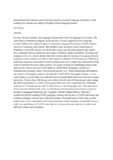Please use this identifier to cite or link to this item:
https://cris.library.msu.ac.zw//handle/11408/3818| Title: | Instructional interventions used to develop cognitive academic language proficiency in the teaching of a content area subject to English second language learners. | Authors: | Nyoni, Erick | Keywords: | instructional interventions academic language proficiency english second language learners |
Issue Date: | 2018 | Publisher: | Midlands State University | Abstract: | In many African countries, the language of instruction is not the language of the home. The curriculum is mediated in English. In the majority of cases, English Second Language Learners (ESLs) have limited Cognitive Academic Language Proficiency (CALP) which is critical for academic achievement. The problem in the secondary school curriculum in Zimbabwe is that ESL learners are faced with content area discourse patterns and content area vocabulary that are unfamiliar and unique to different subject disciplines. Teaching and learning in the 21st Century should shift from content specific teaching to Language focused teaching to make content accessible to ESL learners. Limited CALP becomes an inhibition to unlocking expository information found in content area texts.Content area instruction in ESL contexts therefore becomes interventional. This paper focused on establishing instructional interventions used to develop CALP skills by a Form Three Geography teacher in a Zimbabwean secondary school. The research questionwas ‘What instructional interventions are used by a Geography teacher to develop the CALP of ESL Geography learners. A case study design was used. Data was collected using non-participant observation and focus group interviews. Twenty-four (24) lessons were observed at the rate of 4 lessons per week making the observation period six weeks. Focus group interviews were conducted with 34 learners made up of 17 female learners and 17 male learners in the Geography class. The theoretical framework that informedthis study was the theory of instructional intervention, Cognitive Academic Language Proficiency and Vygotsky’s Social Cultural Theory. The study established that the teaching of ESL geography learners did not have a CALP orientation and teaching strategies were not interventional in nature. The implications of the study are that teachers have to be capacitated with instructional intervention strategies to help ESL learners with a low proficiency of CALP to develop the necessary discourse patterns to understand different content area disciplines. | URI: | https://www.researchgate.net/publication/338124339_INSTRUCTIONAL_INTERVENTIONS_USED_TO_DEVELOP_COGNITIVE_ACADEMIC_LANGUAGE_PROFICIENCY_IN_THE_TEACHING_OF_A_CONTENT_AREA_SUBJECT_TO_ENGLISH_SECOND_LANGUAGE_LEARNERS http://hdl.handle.net/11408/3818 |
| Appears in Collections: | Research Papers |
Files in This Item:
| File | Description | Size | Format | |
|---|---|---|---|---|
| Instructional interventions used to develop cognitive academic language proficiency in the teaching of a content area subject to English second language learners.pdf | Abstract | 70.99 kB | Adobe PDF |  View/Open |
Page view(s)
20
checked on Jul 26, 2024
Download(s)
8
checked on Jul 26, 2024
Google ScholarTM
Check
Items in MSUIR are protected by copyright, with all rights reserved, unless otherwise indicated.



